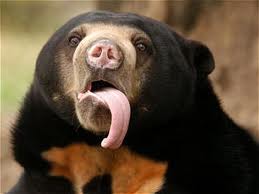{[[' ']]}
']]}
As a member of the Ursidae or bear family, the Sun Bear is known for being the smallest in terms of size, sporting a coat that is described as sleek and short.
Primarily found in parts of Southeast Asia and in Northeast India, Sun Bears are characteristically known for a U-shaped coat pattern found on its chest, typically bearing a light pale-orange hue that contrasts with the dark hued coat that covers its entire body.
As with most bears, Sun Bears are omnivores, with a notorious reputation for consuming a wide range of food types, including insects, plants, lizards, birds, roots.
Known to be solitary bears, Sun Bears are not typically found in groups, with a number of theories noting that this particular Sun Bear trait is borne from the reality of food source competition. Non-hibernating, Sun Bears are also known to reproduce all-year long, not owing the rise of Sun Bear populations to mating seasons or periods.
Though they are the smallest of bears in the world, adult Sun Bears doesn’t really have their own “set” of natural predators, though instances of adult Sun Bears being overwhelmed by pythons, tigers and leopards are known to happen.
But when human threats are concerned, Sun Bear populations have been drastically affected, mostly in cases involving “nuisance bears”, where bears find their way into human habitats thereby causing damage to crops or stores, leaving them to be “hunted down” by affected parties.
Mostly nocturnal, the Sun Bear’s name is somewhat a paradox, a twist to the “Sun” word that is used to define it as a bear species. Given their size, they are also kept as pets in certain households where they are found, but regulations and control on their keeping as pets is being closely watched over by authorized enforcement agencies.















Post a Comment